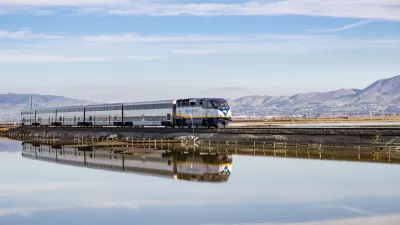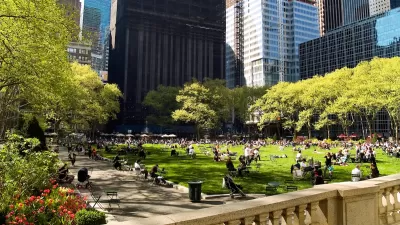Next American City chats with Randal O'Toole -- the "Anti-Planner" -- about the problems of planning and what makes the ideal city.
Next American City: "What's our ideal city? You're always the critic, but if you didn't have to be, if everyone listened to Randal O'Toole and followed your prescriptions, what would that look like?"
Randal O'Toole: "To start with, I worked for 15 years for environmental groups, so I was identified as an environmentalist, and then I've worked for the last 15 years for libertarian groups and I'm identified as a libertarian. But the truth is I'm a pragmatist. I want things that work fine. And, you know, spending millions of dollars and getting very little result and return is not something that work.
[ ]So, I'm a pragmatist. I don't a vision of what a city should look like, I have a vision of a process that allows people to live in the kind of city they want to live in. There's a significant amount of people that want to live in a city like Manhattan or San Francisco. And there's a significant amount of people who want to live in a city like Houston. And what I want is a process that allows people to live in whatever kind of city they do want to live in. I think that if a process were implemented that basically allows property owners to do what they want with their property as long as they're not directly harming other people, and basically allows people to decide how they're going to get around based on the real cost of transportation – making sure that auto drivers pay the full cost of their travel and making sure that people who ride transit pay the cost of they're transit, with, perhaps, subsidies for low-income people who need help – if they have that kind of system I think most American cities would look a little more like Houston and Omaha then San Francisco or New York. But we'd still have dense areas – we'd still have Manhattan, we'd still have downtown San Francisco, for the people who want to live in places like that."
FULL STORY: An Interview With Randall O’Toole, the Anti-Planner

Planetizen Federal Action Tracker
A weekly monitor of how Trump’s orders and actions are impacting planners and planning in America.

Maui's Vacation Rental Debate Turns Ugly
Verbal attacks, misinformation campaigns and fistfights plague a high-stakes debate to convert thousands of vacation rentals into long-term housing.

San Francisco Suspends Traffic Calming Amidst Record Deaths
Citing “a challenging fiscal landscape,” the city will cease the program on the heels of 42 traffic deaths, including 24 pedestrians.

Defunct Pittsburgh Power Plant to Become Residential Tower
A decommissioned steam heat plant will be redeveloped into almost 100 affordable housing units.

Trump Prompts Restructuring of Transportation Research Board in “Unprecedented Overreach”
The TRB has eliminated more than half of its committees including those focused on climate, equity, and cities.

Amtrak Rolls Out New Orleans to Alabama “Mardi Gras” Train
The new service will operate morning and evening departures between Mobile and New Orleans.
Urban Design for Planners 1: Software Tools
This six-course series explores essential urban design concepts using open source software and equips planners with the tools they need to participate fully in the urban design process.
Planning for Universal Design
Learn the tools for implementing Universal Design in planning regulations.
Heyer Gruel & Associates PA
JM Goldson LLC
Custer County Colorado
City of Camden Redevelopment Agency
City of Astoria
Transportation Research & Education Center (TREC) at Portland State University
Jefferson Parish Government
Camden Redevelopment Agency
City of Claremont





























